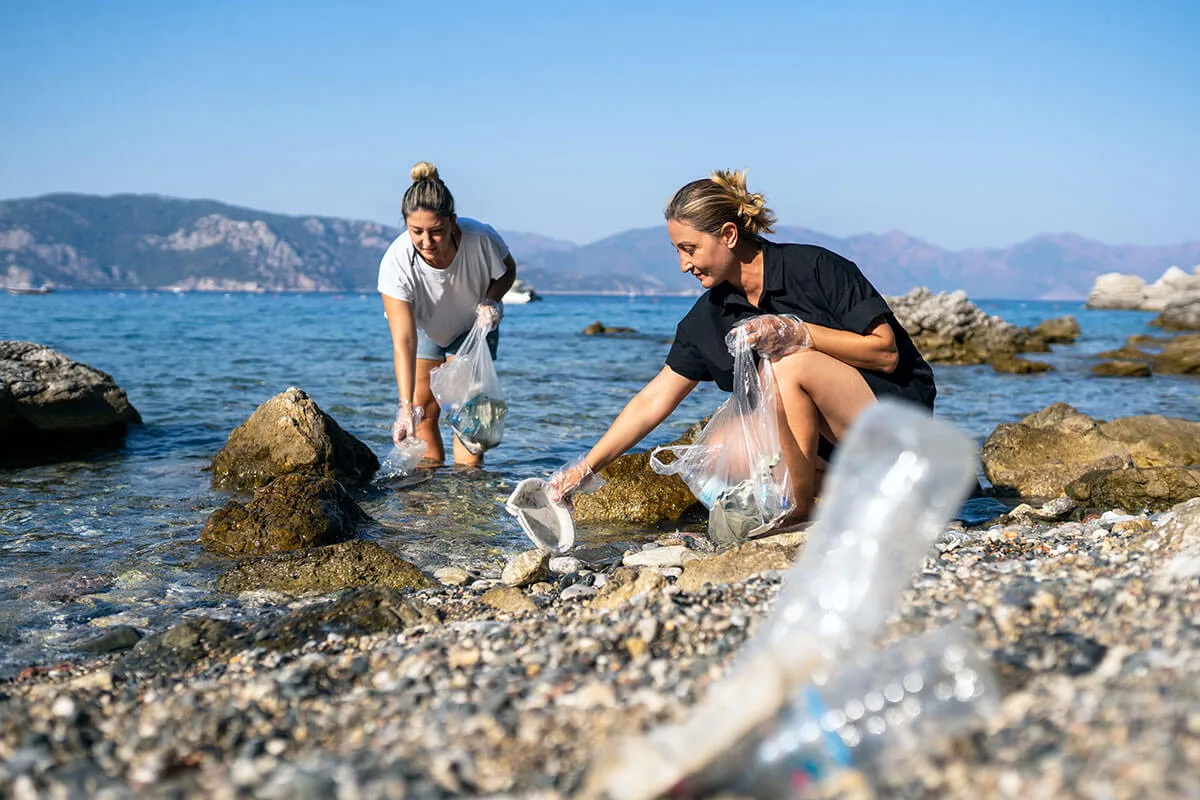 Welcome to “Friday First Step,” your weekly guide to making a difference for our planet. This week, we’re focusing on actionable steps to lessen your carbon footprint and easy ways to help combat climate change. Let’s dive in and make every step count!
Welcome to “Friday First Step,” your weekly guide to making a difference for our planet. This week, we’re focusing on actionable steps to lessen your carbon footprint and easy ways to help combat climate change. Let’s dive in and make every step count!
Reduce, Reuse, Recycle
Start by minimizing your consumption, repurposing items, and recycling correctly. Choosing products with minimal packaging, reusing everyday items creatively, and familiarizing yourself with local recycling guidelines are simple yet effective steps.
- Reduce: Start by minimizing your consumption. Choose products with minimal packaging, buy in bulk, and opt for high-quality items that last longer.
- Reuse: Before you toss anything out, think about how it can be reused. Repurpose glass jars, donate old clothes, and find creative ways to give new life to everyday items.
- Recycle: Make recycling a habit. Familiarize yourself with your local recycling guidelines to ensure you’re recycling correctly.
Opt for Sustainable Transportation
Walking or biking for short trips, using public transport, and carpooling can significantly reduce emissions. These alternatives not only cut down on individual car use but also promote a healthier lifestyle and reduce traffic congestion.
- Walk or Bike: Short trips can often be completed on foot or by bicycle. Not only does this reduce emissions, but it also promotes a healthy lifestyle.
- Public Transportation: Use buses, trains, or subways to cut down on individual car use. Public transportation is a more efficient way to move many people with less environmental impact.
- Carpool: Share rides with colleagues or friends. Carpooling reduces the number of vehicles on the road, which helps decrease emissions and traffic congestion.
Energy Efficiency at Home
Implementing energy-saving measures at home, such as switching to LED bulbs, unplugging devices when not in use, and installing smart thermostats, can lead to significant energy savings and reduced carbon footprint.
- Switch to LED Bulbs: LED bulbs use significantly less energy and last longer than traditional incandescent bulbs.
- Unplug Devices: Electronics and appliances consume energy even when turned off. Unplugging them when not in use can save a surprising amount of electricity.
- Smart Thermostats: Install a smart thermostat to optimize heating and cooling. These devices learn your schedule and adjust temperatures accordingly, saving energy.
Sustainable Eating Habits
Adopting more sustainable eating habits, like reducing meat consumption, buying local produce, and minimizing food waste, can lower the environmental impact of your diet. These changes support local farmers and promote healthier, eco-friendly choices.
- Eat Less Meat: Meat production is a major source of greenhouse gases. Try incorporating more plant-based meals into your diet.
- Buy Local: Support local farmers and reduce the carbon footprint associated with transporting food over long distances.
- Reduce Food Waste: Plan meals, store food properly, and get creative with leftovers to minimize food waste.
 Conserve Water
Conserve Water
Simple actions like fixing leaks, taking shorter showers, and using water-efficient appliances can greatly reduce water consumption. These practices not only conserve a precious resource but also save energy used for water heating.
- Fix Leaks: Even small leaks can waste a lot of water. Regularly check and repair any leaks in your home.
- Shorter Showers: Reduce the time spent in the shower to conserve water and energy used for heating.
- Efficient Appliances: Use water-efficient appliances and fixtures to reduce water consumption.
Support Renewable Energy
Opt for green energy plans from your utility company or consider installing solar panels if feasible. Supporting renewable energy sources like wind and solar power is crucial for reducing reliance on fossil fuels and decreasing carbon emissions.
- Green Energy Plans: Check if your utility company offers green energy plans. Opting for renewable energy sources like wind or solar power can make a significant impact.
- Solar Panels: If feasible, consider installing solar panels on your property to generate your own renewable energy.
Advocate and Educate
Stay informed about climate change, share your knowledge, and engage in political advocacy. Voting for leaders and policies that prioritize climate action and spreading awareness are essential steps in fostering a sustainable future.
- Stay Informed: Keep up with the latest news on climate change and environmental policies. Knowledge is power.
- Spread the Word: Share what you’ve learned with others. Social media, blogs, and community groups are great platforms for raising awareness.
- Engage in Politics: Vote for leaders and policies that prioritize climate action. Your voice matters in shaping a sustainable future.
Organizations to Support
Volunteering your time or donating to organizations dedicated to fighting climate change can amplify your impact. Here are some reputable organizations to consider:
- 350.org: Focuses on building a global grassroots movement to solve the climate crisis.
- The Sierra Club: Works to promote clean energy and combat climate change through advocacy and grassroots campaigns.
- Natural Resources Defense Council (NRDC): Combines the power of more than three million members and activists with the expertise of scientists, lawyers, and policy advocates.
- Environmental Defense Fund (EDF): Known for finding innovative solutions to environmental problems, focusing on climate, oceans, ecosystems, and health.
- Greenpeace: An independent organization campaigning to ensure a just, peaceful, sustainable environment for future generations.
- World Wildlife Fund (WWF): Works on issues regarding the conservation, research, and restoration of the environment.
- Friends of the Earth: An international network of environmental organizations that address a wide range of environmental issues.
- The Climate Reality Project: Founded by Al Gore, it focuses on educating and empowering people to take action on climate change.
Taking the first step is the key to making a difference. By implementing these actionable steps, you can help reduce your carbon footprint and contribute to the global effort to combat climate change. Remember, every small action counts, and together, we can create a sustainable future for generations to come.
See you next Friday for more tips and steps towards a better planet!
Have suggestions or success stories? Share them with us via email: trees@aclimatechange.com or on social media using #FridayFirstStep.

